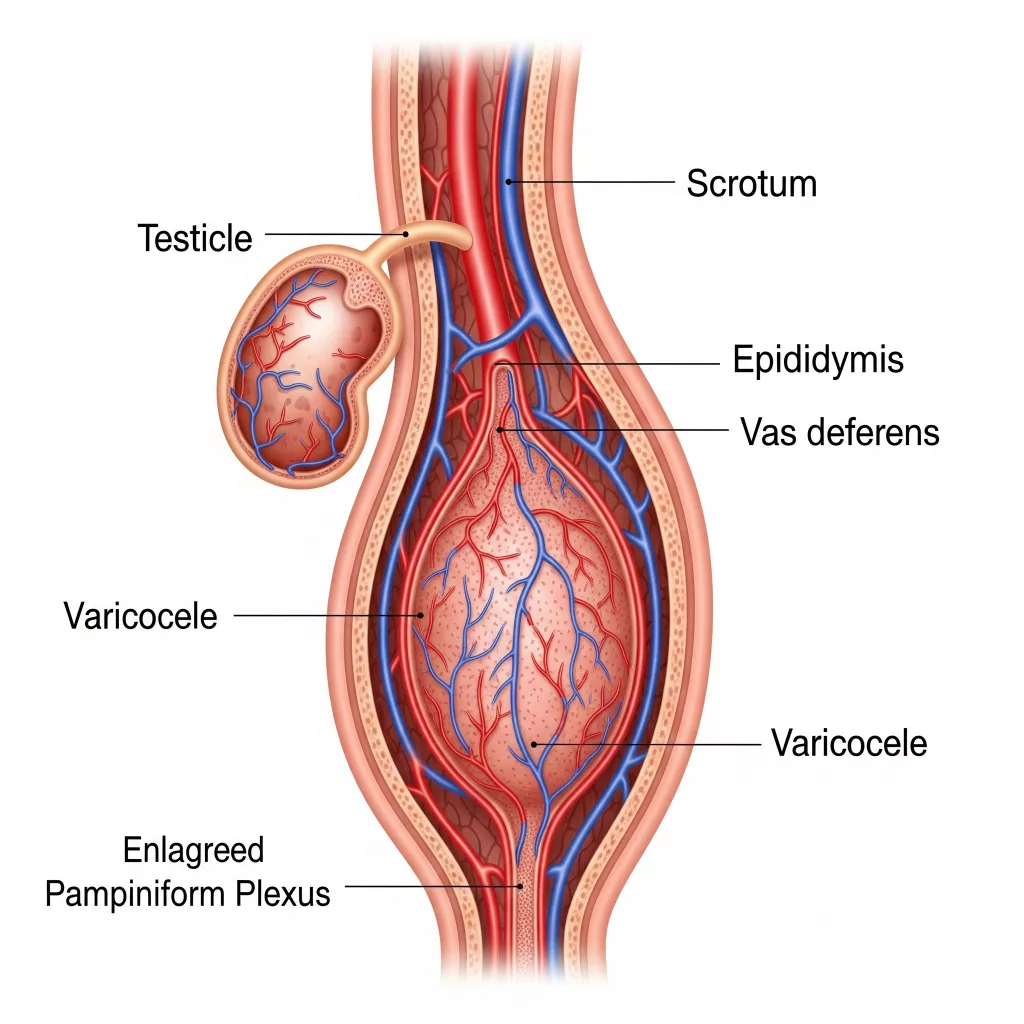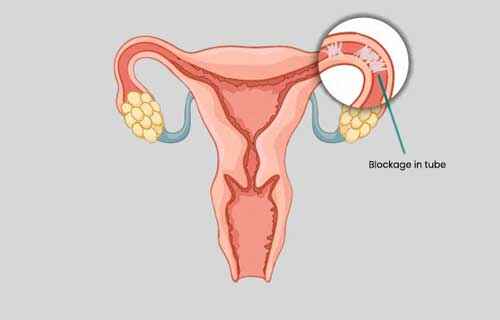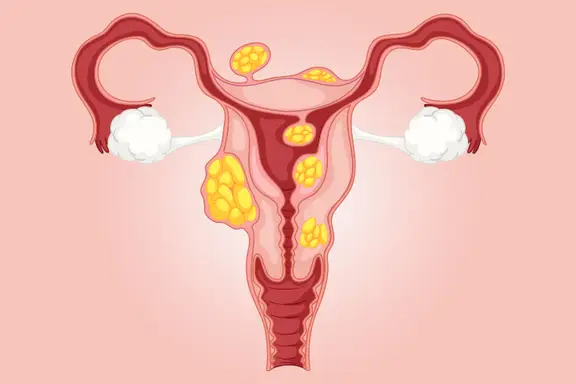
Male infertility is a growing concern today, affecting more couples than ever before. According to recent surveys one of the leading yet often overlooked causes is varicocele, a condition that can silently impair male reproductive health over time. While medical treatments like surgery are available, many men seek a more natural and holistic path to recovery.
At Yog4Lyf, we believe in empowering individuals with Natural tools that support the body’s innate healing ability. In this post, we explore what varicocele is, how it impacts fertility, and how yoga, pranayama, and nutrition can work together to support healing and reproductive well-being.
Understanding Varicocele

Varicocele refers to the enlargement of the veins within the scrotum, specifically those that form the pampiniform plexus. These veins help cool arterial blood before it reaches the testicles a necessary process for healthy sperm production.
When these veins become dilated or twisted, they disrupt normal blood flow and lead to a rise in scrotal temperature. This increase in heat can interfere with sperm development, often leading to reduced fertility.
Most varicoceles develop on the left side of the scrotum due to anatomical reasons, although they can occur on both sides.
How Varicocele Affects Fertility
Varicocele can impact fertility in several ways:
1. Impaired Sperm Production
Increased heat in the testicular area can reduce sperm count, motility (movement), and morphology (shape). These changes directly affect a man’s ability to father a child [1] .
2. Oxidative Stress
The stagnant blood flow associated with varicocele may lead to oxidative stress. This can damage sperm DNA, reduce sperm lifespan, and contribute to early embryo loss after conception.
3. Hormonal Disruption
Varicocele can alter the delicate hormonal balance that supports sperm production and testosterone synthesis. It may affect the communication between the hypothalamus, pituitary gland, and testicles, leading to reduced testosterone levels and impaired reproductive function.
4. Testicular Atrophy
In severe or prolonged cases, the affected testicle may shrink in size due to poor blood circulation and tissue damage.
Male Fertility Course to Heal Varicocele
At Yog4Lyf, each yoga course is carefully guided by certified instructors with over five years of hands-on experience. These asanas have supported many individuals on their journey through Varicocele and Infertility. Over 50,000 users have tried this Men’s Fertility Course and shared positive results through regular and consistent practice.

Symptoms of Varicocele
Varicocele may not always cause noticeable symptoms, but when it does, signs may include:
- A dull ache or discomfort in the testicle, especially after standing for long periods
- A feeling of heaviness in the scrotum
- Visible or palpable twisted veins, resembling a “bag of worms”
- One testicle appearing smaller than the other
- Difficulty in conceiving despite regular unprotected intercourse
Many men discover varicocele only during fertility evaluations.
Diagnosis and Conventional Treatment Options
A varicocele is typically diagnosed through:
- Physical examination during which the doctor may ask the patient to bear down (Valsalva maneuver)
- Scrotal ultrasound to measure the size of the veins and assess blood flow
- Semen analysis to evaluate sperm quality and quantity
Conventional treatments include:
- Varicocelectomy: A surgical procedure to tie off the affected veins and redirect blood flow
- Percutaneous embolization: A minimally invasive procedure that blocks off the faulty veins using coils or chemicals
These methods can be effective, especially in severe cases. However, not all varicoceles require surgery. For mild to moderate cases, lifestyle interventions, including yoga and dietary changes, can offer substantial support.
Can Yoga asanas treat Varicocele ?
Yes According to The International Journal of Yogic, Human Movement and Sports Sciences states, An integrated approach of yoga and naturopathy showed improvement in a patient with varicocele [2].Yoga offers a multidimensional approach to wellness. It combines physical movement, breath control, and mental awareness, making it especially effective in addressing underlying factors contributing to varicocele and infertility.
Improves Blood Circulation
Yoga postures promote better blood flow throughout the body, including the pelvic region. This can help reduce venous congestion in the scrotum and support natural drainage of blood.
Relieves Stress
Chronic stress can suppress reproductive hormones and increase inflammation in the body. Yoga helps activate the parasympathetic nervous system, promoting relaxation, rellief from Migranes and hormone balance.
Strengthens the Pelvic Floor
Many yoga poses engage and tone the pelvic muscles, supporting reproductive organs and improving their function.
Regulates Hormones
Through consistent practice, yoga helps balance the endocrine system, which governs testosterone production and overall reproductive health.
Reduces Internal Heat
Certain pranayama practices help reduce excess heat in the body, which may be beneficial in managing varicocele-related symptoms.
Yoga for Varicocele
At Yog4Lyf, yoga asanas are combined after years of research and refinement by certified trainers, with a clear focus on concerns like Varicocele and Infertility. The programs follow a systematic approach that combines yoga asanas and diet guide to initiate treatment of the fertility issues from roots, rather than temporary fixes. A set of yoga asanas beneficial for varicocele are given below.
Viparita Karani (Legs-Up-The-Wall Pose)
This inversion posture encourages blood to flow away from the lower body, easing pressure in the scrotum. It is deeply calming and supports the circulatory and nervous systems.
Sarvangasana (Shoulder Stand)
An advanced pose that increases blood circulation to the pelvic area and enhances endocrine function. It is beneficial for hormonal regulation but should be approached with caution and proper guidance.
Setu Bandhasana (Bridge Pose)
This pose strengthens the lower back, pelvis, and thighs while stimulating reproductive organs. It also encourages better venous return from the pelvic region.
Baddha Konasana (Bound Angle or Butterfly Pose)
This pose gently opens the hips and groin area, increases flexibility, and improves blood flow to the testicles.
Paschimottanasana (Seated Forward Bend)
A calming pose that stretches the spine and hamstrings, massages the abdominal area, and supports testicular health.
Utkatasana (Chair Pose)
Strengthens the legs, core, and pelvic muscles. It improves posture and promotes healthy circulation in the lower body.
Pranayam for healing Varicocele
Breath control practices the Pranayam can reduce stress, improve oxygenation, and regulate internal systems essential for fertility.
Anulom Vilom (Alternate Nostril Breathing)
Balances the nervous system and purifies energy channels, helping regulate hormones and improve focus.
Bhramari (Bee Breath)
A calming technique that quiets the mind and supports the function of the pituitary gland, which plays a role in reproductive health.
Sheetali and Sheetkari (Cooling Breaths)
These practices cool down the body’s internal temperature, helping mitigate the heating effects of varicocele.
Dietary Guidelines to Heal Varicocele and Male Fertility
Diet plays a key role in managing inflammation, supporting hormone production, and improving sperm quality.
Foods to Include
- Antioxidant-rich fruits like berries, pomegranates, and amla to combat oxidative stress
- Nuts and seeds such as almonds, walnuts, flaxseeds, and pumpkin seeds for healthy fats and zinc
- Leafy greens and cruciferous vegetables to support detoxification and hormonal balance
- Whole grains and legumes for steady energy and essential nutrients
- Omega-3 fatty acids from flaxseeds, chia seeds, and fatty fish to support testicular function [3] as mentioned in Journal of Dietary Supplements.
Foods and Habits to Avoid
- Highly processed foods, sugar, and refined carbs
- Excess caffeine, alcohol, and tobacco
- Prolonged exposure to heat such as hot tubs or saunas
- Wearing tight underwear or sitting for long hours without breaks
A Yog4Lyf’s Holistic Approach via :- Yog4Lyf App
In our app you will get
Diet Plans: Nutrition guides to complement yoga practice.
Community Support: Forums to share experiences and victories.
Safety and Contraindications
Yoga should always be practised mindfully. Certain postures may need modification or avoidance depending on individual health conditions.
- Avoid forceful poses during severe abdominal discomfort
- Modify postures if experiencing pain
- Stop practice if dizziness or discomfort occurs
Always seek medical guidance if symptoms worsen or persist.
Frequently asked Questions
1.Will Varicocele go away?
mild varicocele symptoms can be managed and improved with lifestyle changes, targeted exercises, yoga, and improved blood circulation.
Grade 1 (mild): Can often be managed well with lifestyle changes, yoga, and circulation improving practices.
Grade 2 (moderate): Symptoms can be reduced with consistent and commited yoga and diet plans.
Grade 3 (severe): Does not heal naturally and typically requires medical or surgical treatment, states MD Dirk Manski [4].
Early diagnosis and consistent management help prevent progression and fertility complications.
2.Can Yoga reduce Vricocele?
In early-stage varicocele, yoga helps by improving blood circulation and reducing venous pressure in the pelvic and scrotal area. Regular practice also supports hormonal balance and prevents progression of the condition.
3.Can Varicocele cause Infertility?
According Dr. Rajeev Kumar (AIIMS, New Delhi) & Dr. Rupin Shah (Lilavati Hospital, Mumbai). Varicocele can cause testicular DNA damage, apoptosis, and increased reactive oxygen species, all of which impair fertility [5] . varicocele can contribute to male infertility, especially if left untreated.Not all men with varicocele become infertile, but advanced to severe stages increase the risk. Early management helps protect sperm production.
4.Can varicocele be cured without Surgery?
In mild or early-stage varicocele, symptoms can often be managed without surgery through regular yoga, stress reduction, and improved blood circulation. Yoga support sperm production, improves sperm quality, helping prevent further progression. However, severe varicocele usually does not fully resolve without medical treatment.
Heal Varicocele Naturally with Yoga
Varicocele is a manageable condition till stage 2 and in many cases, it does not require surgery. Through dedicated yoga practice, conscious breathing, and mindful eating, men can take an active role in improving their reproductive health naturally.
At Yog4Lyf, we are here to walk with you on this journey. Whether you are just starting or exploring alternatives to conventional treatment, know that your body has the potential to heal when supported with the right practices.
If you are seeking guidance, we invite you to join our fertility-focused yoga programs, designed with care and rooted in traditional yogic wisdom.
Disclaimer –This article is meant to support awareness and well-being, not replace medical care. If you have ongoing symptoms or a diagnosed condition, please consult a qualified healthcare professional before starting any new practic











